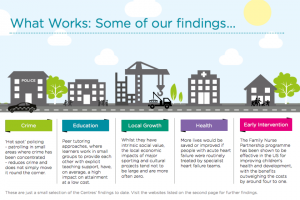When I was appointed as Cabinet Secretary back in January 2012, I spoke of my ambition to increase evidence based policy-making and for independent arbiters, equivalent to NICE, to encourage third party investors to back public policy interventions that are proven to work. The What Works Network, launched in March 2013 is starting to fulfil this ambition by ensuring that robust evidence underlies local and national policy-making. There are so many areas of public spend where we still have no real evidence about whether the interventions that we are investing money into actually work, and the ‘What Works’ initiative seeks to address this, covering policy areas with £200 billion of public spending.
Five of the 6 initial Centres have now been in action for a year or more, and last month saw the launch of the new What Works Centre for Wellbeing. I have been really impressed by what the centres have achieved to date. Some key achievements include:
- The Education Endowment Foundation ‘teaching and learning toolkit’ which synthesises over 10,000 pieces of quantitative educational research and turns it into practical, accessible advice to help head teachers and decision-makers decide how best to spend their limited funds in schools. They’re now involving over 4,500 schools in their trialling work and building and sharing the evidence base in a completely revolutionary way. I was delighted earlier this year to see this in action at ARK Conway Primary school in Acton.
- Other centres, like the Early Intervention Foundation, are changing the landscape with their targeted work with Local Authorities to improve cost-effective spend on interventions that work locally, and the College of Policing Centre on Crime Reduction which is working with national commissioners and local decision-makers, including Police and Crime Commissioners, to help them understand what works and what doesn’t.
- As well as disseminating findings, the What Works Centres are actively building links with policy makers in relevant departments according to policy area, and with HM Treasury. For example, the What Works Centre for Local Economic Growth is working directly with BIS analysts supporting the cross-departmental Local Growth team, looking at how they can advise on evaluation methods and building local analytical capacity, as part of the projects in the Local Growth Deals.
Three actions I’d like to see all policy-making and commissioning civil servants take:
- I would urge you to make sure you are up to speed with what the What Works Centres in your area are doing – you can find out more on the What Works page on Gov.uk. Today the Work Works team have published a report of their major findings and are hosting an event at the Institute for Government to showcase the work of the Centres. The report highlights some initial findings: on education, crime, health, local growth and early intervention. I would encourage you all to read this report to understand what they are doing, and how it relates to your own work.
- Make the most of the new training opportunities around analysis and use of evidence and make sure you have got the skills to use evidence effectively in your role.
- Think about opportunities to trial and test new programmes, or to tweak existing programmes – how do you know if what you’re spending money on is really effective? Often as policymakers, we don’t know what will work, but we can do something about this by designing our policies and practice to test, learn, and adapt everything we do.
This is a quietly radical and important agenda, and I urge all across the public sector to embrace it.


1 comment
Comment by Sitebee posted on
I`m thinking of going into politics myself, i`m almost certain I could`nt any worse than current leaders in parliment and the civil service sector. Vote for me http://sitebee.co.uk